#java coding question
Explore tagged Tumblr posts
Text
0 notes
Text
Node based coding... in Java. It has taken a few weeks, but I have the system done.
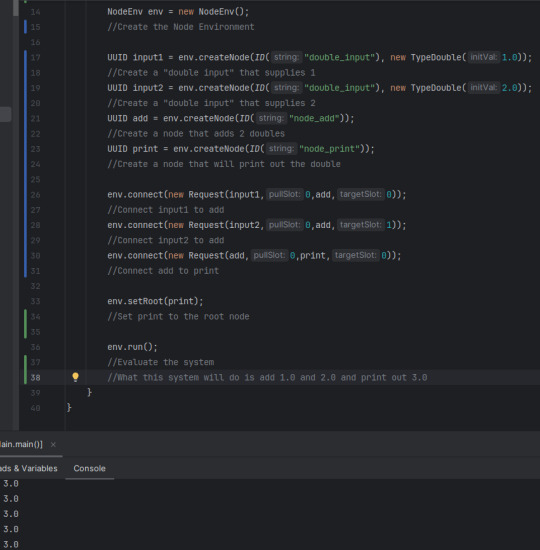
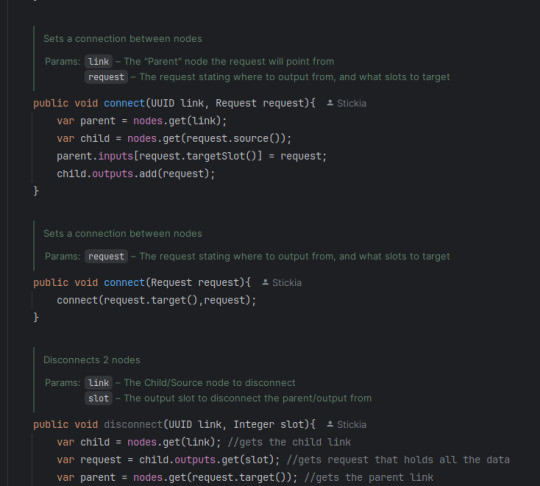
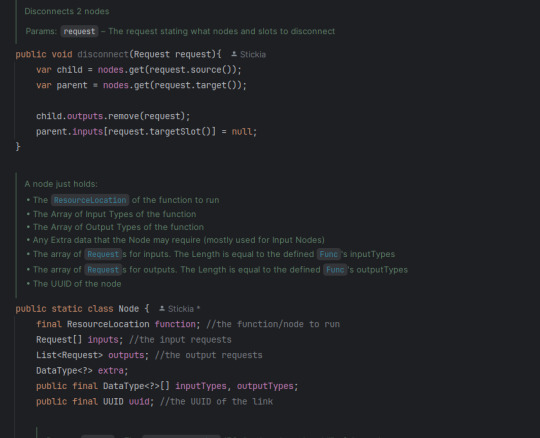
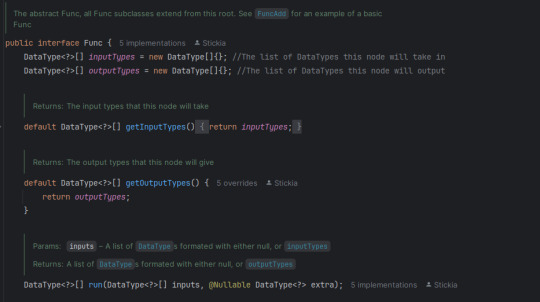
As well, amazingly commented code base that explains what about everything does.
And everything being ran as functions defined in a registry! Hi NeoForge
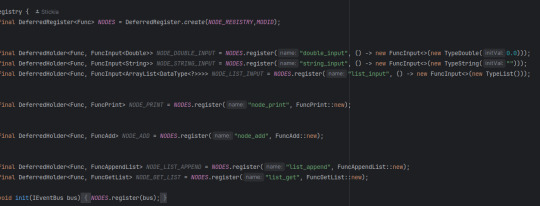
I think the system for reading the graph of nodes is unique also! Since, I have had... a bad time with the JavaStackLimit, I decided to have the core of my system be around avoiding it as much as possible. So instead of recursively asking what node connects to what node, 2 stacks are made, 1 holds what will be running after it is done finding, the other holds a search stack. Meaning it can get any part of the graph, and it should just find the right order of things.
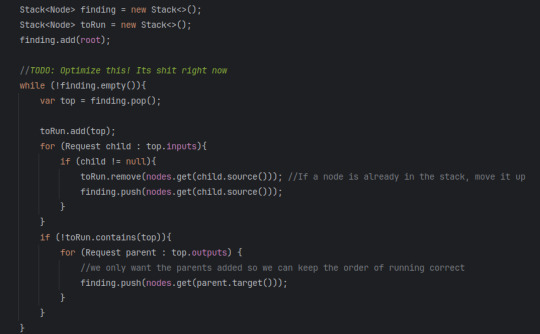
And! Since the read method is different from the run method, I can hypothetically just read and serialize the given node stack, making it persist between restarts.
The running system is a little more complex than just a search.
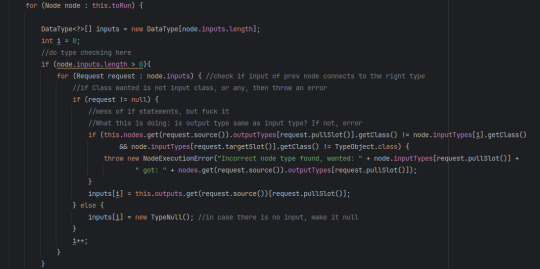
First it starts a `for` loop of the stack of nodes, then it starts making the inputs for the node. It checks if the node has any inputs, if so, check the output type of the previous node, if it is equal to this node's input (or if this node's input takes in ANY) then dont error. After not erroring, add to the input array; or, if the input was not connected to anything, give it null. Repeat the last steps until there are no inputs left for this node.
Next, it runs the node. It does this by getting all the registered nodes (in a HashMap for some extra speed), then finding the associated function with that Key. Then it tries to run the function with the given inputs. If the function does not crash, it checks if the function outputted anything, if so put that into the Environment's HashMap of all node outputs. Finally, repeat the last 2 paragraphs until there are no more nodes. Then clear the output map, so there is no "bleed over"
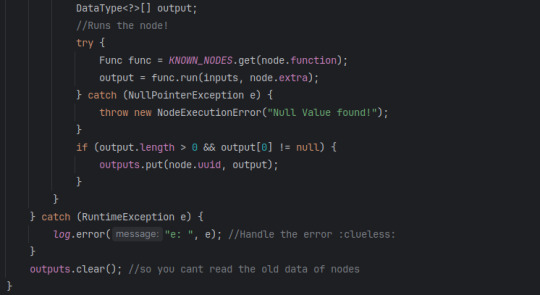
So TLDR: get all nodes into a stack (avoiding duplicates), then run a For Each over that stack, check if the type of inputs/outputs match, if so run the node and put its outputs onto a HashMap of outputs so it only needs to be run once.
And ALL OF THIS just to be put into a silly minecraft mod. But hey, at least I am having fun!
#long post#my art#modded minecraft#coding#Java#minecraft java#minecraft modding#minecraft modding at its finest yall#there is also a lot more in this mod I have not shown in Tumblr yet#If any of yall have any questions#my DMs/Askbox is open!
10 notes
·
View notes
Text
brooooo does anyone know java or python bc im taking some virtual high school classes rn and im following along and dont understand shit and google is unhelpful bc everything i find is a paragraph of technobabble with no dictionary at the bottom, a subreddit full of the meanest old assholes that i never want to interact with especially about beginners stuff bc their advice seems to boil down to "yeah youll figure it out lol" or literal insults???, or a youtube channel that works for one thing but skips the next section that i ALSO need help with
#the java is code.org and the python is on codehs if that helps anyone#the teachers take like a day to get back w answers to questions esp bc i do my vhs after school hours#bc i have more monitors in my room n can keep everyone out so its quiet#javaprogramming#java#javascript#python#python coding#help#pleaseeee dm me if you can help me#might not respond til abt 4pm ish my timezone bc imma pass tf out after this+school#ive cried SO much today yall#have mercy random internet strangers
5 notes
·
View notes
Text
i want to cry because on only the second day of my coding class its too hard and im never gonna be able to do it
#like aghhh why does this not make sense?#once we get to return types and shit#like what does a return type do#why is it different than a user input#i have so many questions#but if i ask i will look too stupid#what the hell am i doing with my life#noromo35 talks#coding#game dev#java#java coding#game development#coding classes#coder
27 notes
·
View notes
Text
Java Projects for Your Resume: Why They Matter

Java Projects for Your Resume: Why They Matter
Adding Java projects to your resume can really help you land a job. Employers want to see real experience, and showcasing projects shows that you know how to apply your skills. A solid portfolio stands out more than just having certifications. These projects reflect your problem-solving skills, creativity, and understanding of Java basics and advanced concepts. Whether you’re just graduating or changing careers, having practical projects is important. Students taking Java course in Coimbatore are often encouraged to create live applications to boost their resumes and improve their chances in job interviews.
Simple Java Projects for Beginners
If you're just starting out, try adding basic Java projects like a calculator, to-do list, or temperature converter to your resume. These projects are great for grasping object-oriented programming and basic GUI design. They’re usually part of beginner exercises in Java training programs in Coimbatore, helping you learn coding logic efficiently. Working on simple applications also enhances your debugging and problem-solving skills, which are key for coding interviews. It’s a good idea for beginners to focus on these smaller projects before tackling more advanced systems.
Intermediate Java Projects That Impress
Once you’ve got the basics down, you can move on to intermediate-level Java projects for your resume, like library management systems, quiz apps, or student record management tools. These projects show that you have a better grasp of file handling, user authentication, and data structures. Many Java course in Coimbatore make sure students work on these types of projects to build real-world problem-solving skills. These applications don’t just show off your technical skills; they also demonstrate that you can create user-friendly programs.
Advanced Java Projects That Stand Out
For those with more experience, advanced projects could include chat applications, e-commerce websites, or banking systems using JavaFX or Spring Boot. These projects show that you’re skilled in frameworks, APIs, and databases. Many top Java training programs in Coimbatore include this type of work in their syllabus. Having these projects on your resume proves to employers that you’re ready for the job and can manage larger systems. Using GitHub to share your source code, along with documentation and screenshots, can give you an edge.
Importance of Full-Stack Java Projects
A full-stack Java project covers both the frontend and backend, often using HTML, CSS, JavaScript, Java, and MySQL. These projects help show that you’re not just focused on the backend but can also manage UI and databases. Joining a Java course in Coimbatore that includes full-stack content will give you an advantage in today’s job market. Such projects mimic real work environments and prove you can handle end-to-end application development.
Using Java Projects to Show Teamwork
Employers often look for teamwork skills. Including team-based Java projects on your resume, where you collaborated with others, demonstrates your ability to communicate, manage tasks, and work with version control systems like Git. Group projects in Java training programs in Coimbatore teach students how to build scalable applications with effective task management. Showcasing these projects on your resume emphasizes both your technical abilities and your teamwork qualities.
How to Present Java Projects on a Resume
When listing Java projects on your resume, make sure to include the project title, a brief description, the technologies you used, and your role in the project. Focus on the impact of your work—did it solve a real problem or improve performance? Students in Java course in Coimbatore learn how to document and present their projects for interviews. Adding links to demos or GitHub repositories is a nice touch. How you present your projects can help you stand out to potential employers.
Mistakes to Avoid While Showcasing Java Projects
Avoid listing too many projects that aren’t complete or too similar. Don’t just focus on frontend work; employers want to see sound coding and backend integration too. Students in Java training programs in Coimbatore are advised to keep their code clean, well-documented, and free of bugs. Steer clear of copying projects from the internet; instead, focus on customizing and innovating based on your learning. This shows creativity and confidence, and you'll be better prepared for questions about your projects in interviews.
How Projects Improve Your Job Readiness
Including Java projects on your resume is vital for showing you’re ready to work. It shows you can create practical applications with your skills. Employers want candidates who can contribute from day one. A strong portfolio, supported by a solid Java course in Coimbatore or good Java training program, can greatly improve your hiring chances. Recruiters appreciate real-world experience over just theoretical knowledge or course certificates.
Conclusion: Learn, Build, and Stand Out with Xplore IT Corp
If you want to get good at Java and build impressive projects for your resume, then a structured Java course in Coimbatore is a great place to start. At Xplore IT Corp, we provide relevant Java training that includes hands-on project development, resume-building workshops, and full placement support. With real experience and guidance, you can create a portfolio that impresses employers. Let your Java projects show your skills learn, build, and grow with us at Xplore IT Corp.
FAQs
1. What types of Java projects should I include in my resume?
Include a mix of simple, intermediate, and advanced projects to showcase various Java skills like OOPs, file handling, APIs, and databases.
2. How many Java projects should I list on my resume?
List 2 to 4 well-documented projects. Focus on quality rather than quantity, ensuring each project highlights a unique skill set.
3. Do Java projects really help in getting a job?
Yes, they provide evidence of your coding skills and can help you make a strong impression in interviews, especially for roles needing practical programming.
4. Where can I get help for building Java projects?
Enrolling in a Java course in Coimbatore, like the one offered by Xplore IT Corp, can provide expert guidance, resources, and structured projects.
5. Can I use GitHub to showcase my Java projects?
Definitely! GitHub is a great platform to display your work to potential employers. Include links to your GitHub projects in your resume for easy access.
#Java programming#Java developer#Java applications#Java frameworks#Java projects#Java coding#Java syntax#object-oriented programming#Java backend#Java frontend#Java database connectivity#Java Spring Boot#JavaFX#Java GUI#Java tools#Java version control#Java IDE#Java servlet#Java web development#Java interview questions
0 notes
Text
30 Advanced Java Interview Questions and Answers
Get ready for your Java interview with our list of 30 advanced questions. These questions cover key topics and will help you prepare for tough interviews. Use them to test your knowledge, improve your skills, and make a great impression. Check out our easy-to-understand explanations and get ready to succeed!
👉 CLICK HERE TO EXPLORE

0 notes
Text
Explain about Collector.teeing feature in the Java Stream API in Java 12?
The Collector.teeing feature introduced in Java 12 is a powerful addition to the Collector interface in the Java Stream API. It allows you to combine the results of two downstream collectors into a single result using a provided BiFunction. Here’s a detailed explanation along with a sample code demonstrating its usage: Explanation: The Collector.teeing method takes three…
View On WordPress
#Best Practices#Coding Interview#Collector.teeing#interview#interview questions#Interview Success Tips#Interview Tips#Java#Java Stream API#programming#Senior Developer#Software Architects
0 notes
Text
Mastering Advanced Java Interview Questions: The Complete Guide
Introduction To enhance your career in Java programming, you must grasp **advanced Java interview questions**. In this thorough tutorial, we'll dig into the complicated realm of advanced Java ideas, which may help you stand out in interviews and develop your career.
Understanding the fundamentals 1. Object-Orientated Programming (OOP) Advanced Java requires a deep understanding of Object-Oriented Programming (OOP) ideas. Interviewers frequently test your comprehension of concepts like as encapsulation, inheritance, polymorphism, and abstraction. Provide real-world examples that demonstrate your ability to apply these ideas.
2. Exception Handling Exception handling is an important part of building resilient Java programs. Dive into the complexities of attempt, catch, throw, and finally.Discuss your experiences with checked and unchecked exceptions, and demonstrate how you've achieved graceful error handling in your applications.
Advanced Java Topics. 3. Multithreading and concurrency. Multithreading and concurrency are areas where experienced Java developers excel. Explain the relevance of multithreading, talk about thread life cycles, and demonstrate your thread synchronization skills. Describe situations where you've improved performance using efficient concurrency methods.
4. Internals of the Java Virtual Machine (JVM Interviewers frequently test your understanding of Java Virtual Machine (JVM) internals. Go beyond the fundamentals and investigate memory management, trash collection, and class loading techniques. Share your experience improving code for improved JVM performance.
5: Design Patterns Showcase your grasp of design patterns like Singleton, Observer, and Factory. Offer insights regarding how you've Implemented these practices to improve code maintainability and scalability. Interviewers value applicants who can translate academic knowledge into practical applications.
Database connectivity. 6: Java Database Connectivity (JDBC) Java Database Connectivity (JDBC) is the foundation of Java's interface with databases. Discuss your ability to make database connections, execute queries, and handle transactions. Showcase how you improved database processes in your projects.
7. Hibernate Framework. Explore the world of Hibernate, an object-relational mapping (ORM) framework. Share your experiences mapping Java objects to database tables, and explain how Hibernate simplifies complicated database interactions. Highlight the benefits of utilizing Hibernate with Java applications.
Advanced Data Structures & Algorithms 8. Collection Framework Collections Framework is a critical component of Java programming. demonstrate your understanding of many collection interfaces and classes. Discuss examples in which using the proper data structure resulted in improved code performance.
9: Algorithm Optimization Interviewers frequently offer issues pertaining to algorithm optimization. Demonstrate your problem-solving abilities by describing how you've improved algorithms for reduced time and space complexity. Discuss the effects of your improvements on overall system performance.
Conclusion: Mastering advanced Java interview questions is more than just academic knowledge; it is also about demonstrating practical experience. You'll be prepared to face any interview problem if you properly comprehend OOP concepts, delve into advanced Java subjects, master database connection, and excel at data structures and algorithms.
To learn more about this you can visit analytics jobs
0 notes
Text
How to Hire a Java Developer | Find Java Programmers

In the present technology-driven era Java remains the cornerstone for software development. A wide range of applications are developed using Java due to it’s versatility and robustness. If you are looking to hire a Java developer you must be well aware of their hiring demand. A streamlined recruitment process can do the trick and therefore you must have a list of the must-ask Java developer interview questions. Bookmark this article where we will provide you with a checklist of the interview questions.
Key Java Interview Questions to Ask When You Hire Developers
To make a well-informed hiring decision you must dive into the specifics of the interview process. To prepare for what Java interview questions to ask you must first have an outline of the candidate's background. For this evaluate their resume and work portfolio to gauge an understanding of their expertise, skill set, and competence. Align these insights with an understanding of your requirements and then ask the following questions:
Technical Interview Questions
The technical interview helps you evaluate a candidate’s programming skills and knowledge of Java. Asking the following Java coding interview questions helps you evaluate the technical acumen of the candidates:
Explain the significance of the “static” keyword in Java and it’s usage.
State the difference between JDK, JRE, and JVM in Java.
What is multithreading in Java and how can you achieve synchronization?
State the difference between ArrayList and LinkedList and when is it right to apply each of them.
What are SOLID principles and what’s their relation to Java development?
State the advantages and disadvantages of using Java’s Garbage Collection mechanism.
Provide an example of exception handling in Java using try-catch blocks.
What is the purpose of the “equals” and “hashCode” methods in Java?
Highlight the key differences between Java 8 and Java 11. Also, mention the impact of these changes on your development work.
Soft skills and compatibility
Additionally, apart from these theoretical core Java interview questions also give coding challenges to the candidates that help you evaluate their soft skills such as:
Problem-solving ability
Coding expertise
Ability to deal with challenges without hampering the deadlines
Attention to detail
Organizational skills
Adaptability
Team spirit
Cultural fit
Experience and portfolio
Ask Java developer interview questions that encourage the candidates to share their previous work experience, challenges they have encountered, how they mitigated those problems, and how they contributed to the overall success of the project. Review their work portfolio and reach out to their references to gain insights related to their:
Coding style
Quality
Commitment and reliability
Work ethic
Suitability for the role
Closing Words
Therefore, asking the right Java developer interview questions has a vital role to play in the success of your development project. By conducting a well-structured interview and asking relevant questions you can possess a valuable asset in your organization.
Talent networks like Uplers can offer a streamlined hiring process with detailed interview in it’s rigorous 4-step vetting process. Find a qualified match in less than 2 weeks from a pre-vetted network of the top 3.5% Indian remote talent at up to 40% cost-saving. For more details check Uplers website.
#Java Developer Interview questions#java interview questions#core java interview questions#java coding interview questions
0 notes
Text
girl who received the highest grade possible


girl who 3 days before final exam decided to finally go study
#i was not expecting those questions at all i thought it would be more technical or sth about java code#my question was what is android studio...
14 notes
·
View notes
Text
Ok, I’ve delved into Twine Sugarcube a little and I’ve had some revelations I feel the need to share.
1. Sugarcube is the devil. I mean that in the nicest way possible. I thought I was coding before… nope! I’m going to learn it anyway because the breadth of stuff I can do is amazing and worth it, but holy hells is this hard. Which leads me to number 2…
2. My fellow IF authors who use Sugarcube, you are now like gods to me. Massive respect for you. 👊 Seriously, the time and effort it takes to create a story in this, and to do it so seamlessly as many of you do, is mind boggling.
3. I don’t feel I’ve given enough credit to Chapbook. You’ve seen me talk about the lack of a save system. But for a shorter story like Viatica (currently at 155k words with Rebellion ending and coding) I don’t feel it’s a massive deal breaker. It also has no easy way to display stats or inventory or a codex. I had to jerry rig my own stats passage.
But what it does well, it does exceptionally well. Chapbook is a complete out-of-the-box format and requires no previous CSS or HTML experience. It automatically formats everything for you, headers, footers, the adaptability to be read on any device, it’s all there. There is no style sheet to create, no Java script. The biggest challenge is coding choices and variables, but even then Chapbook comes with an easy to read guide that spells out everything you can possibly need. I would also be happy to answer questions or share screenshots of what I’ve done. If you’ve been wanting to try your hand at IFs but the idea of coding is daunting, you can use Chapbook. If you want to focus on the writing, your craft, and don’t have the time or inclination to heavily code, you can use Chapbook. If you’ve never coded a damn thing in your life and think CSS stands for “can’t style shit”, YOU CAN USE CHAPBOOK!
In conclusion, Sugarcube is evil incarnate, but I’m going to learn it anyway. Hail, Satan. Chapbook is mercy incarnate. Thank you, my lord and savior. And if you’re a newcomer and on the fence at all, I encourage you to give Chapbook a try. Say it with me… you can do it. 🤗
80 notes
·
View notes
Text

Women pulling Lever on a Drilling Machine, 1978 Lee, Howl & Company Ltd., Tipton, Staffordshire, England photograph by Nick Hedges image credit: Nick Hedges Photography
* * * *
Tim Boudreau
About the whole DOGE-will-rewrite Social Security's COBOL code in some new language thing, since this is a subject I have a whole lot of expertise in, a few anecdotes and thoughts.
Some time in the early 2000s I was doing some work with the real-time Java team at Sun, and there was a huge defense contractor with a peculiar query: Could we document how much memory an instance of every object type in the JDK uses? And could we guarantee that that number would never change, and definitely never grow, in any future Java version?
I remember discussing this with a few colleagues in a pub after work, and talking it through, and we all arrived at the conclusion that the only appropriate answer to this question as "Hell no." and that it was actually kind of idiotic.
Say you've written the code, in Java 5 or whatever, that launches nuclear missiles. You've tested it thoroughly, it's been reviewed six ways to Sunday because you do that with code like this (or you really, really, really should). It launches missiles and it works.
A new version of Java comes out. Do you upgrade? No, of course you don't upgrade. It works. Upgrading buys you nothing but risk. Why on earth would you? Because you could blow up the world 10 milliseconds sooner after someone pushes the button?
It launches fucking missiles. Of COURSE you don't do that.
There is zero reason to ever do that, and to anyone managing such a project who's a grownup, that's obvious. You don't fuck with things that work just to be one of the cool kids. Especially not when the thing that works is life-or-death (well, in this case, just death).
Another case: In the mid 2000s I trained some developers at Boeing. They had all this Fortran materials analysis code from the 70s - really fussy stuff, so you could do calculations like, if you have a sheet of composite material that is 2mm of this grade of aluminum bonded to that variety of fiberglass with this type of resin, and you drill a 1/2" hole in it, what is the effect on the strength of that airplane wing part when this amount of torque is applied at this angle. Really fussy, hard-to-do but when-it's-right-it's-right-forever stuff.
They were taking a very sane, smart approach to it: Leave the Fortran code as-is - it works, don't fuck with it - just build a nice, friendly graphical UI in Java on top of it that *calls* the code as-is.
We are used to broken software. The public has been trained to expect low quality as a fact of life - and the industry is rife with "agile" methodologies *designed* to churn out crappy software, because crappy guarantees a permanent ongoing revenue stream. It's an article of faith that everything is buggy (and if it isn't, we've got a process or two to sell you that will make it that way).
It's ironic. Every other form of engineering involves moving parts and things that wear and decay and break. Software has no moving parts. Done well, it should need *vastly* less maintenance than your car or the bridges it drives on. Software can actually be *finished* - it is heresy to say it, but given a well-defined problem, it is possible to actually *solve* it and move on, and not need to babysit or revisit it. In fact, most of our modern technological world is possible because of such solved problems. But we're trained to ignore that.
Yeah, COBOL is really long-in-the-tooth, and few people on earth want to code in it. But they have a working system with decades invested in addressing bugs and corner-cases.
Rewriting stuff - especially things that are life-and-death - in a fit of pique, or because of an emotional reaction to the technology used, or because you want to use the toys all the cool kids use - is idiotic. It's immaturity on display to the world.
Doing it with AI that's going to read COBOL code and churn something out in another language - so now you have code no human has read, written and understands - is simply insane. And the best software translators plus AI out there, is going to get things wrong - grievously wrong. And the odds of anyone figuring out what or where before it leads to disaster are low, never mind tracing that back to the original code and figuring out what that was supposed to do.
They probably should find their way off COBOL simply because people who know it and want to endure using it are hard to find and expensive. But you do that gradually, walling off parts of the system that work already and calling them from your language-du-jour, not building any new parts of the system in COBOL, and when you do need to make a change in one of those walled off sections, you migrate just that part.
We're basically talking about something like replacing the engine of a plane while it's flying. Now, do you do that a part-at-a-time with the ability to put back any piece where the new version fails? Or does it sound like a fine idea to vaporize the existing engine and beam in an object which a next-word-prediction software *says* is a contraption that does all the things the old engine did, and hope you don't crash?
The people involved in this have ZERO technical judgement.
#tech#software engineering#reality check#DOGE#computer madness#common sense#sanity#The gang that couldn't shoot straight#COBOL#Nick Hedges#machine world
44 notes
·
View notes
Text



I try to make a balance between reading the book "Kafka: The Definitive Guide - 2nd Edition," doing Confluent course lab exercises, and a little bit of Udemy projects with Kafka as well. In the middle of the week, I'm making my homepage to showcase some portfolio stuff, which is not my priority at this time, but it involves a lot of coding as well.
Feeling like I can answer any interview questions about Kafka at this point, including the fundamentals, use cases, and examples of writing a pub/sub system in Java.
It's all about studying; it magically changes you inside and out. You're the same person, in the same place, but now capable of creating really good software with refined techniques.
#coding#developer#linux#programmer#programming#software#software development#student#study aesthetic#study blog#studyblr#studynotes#study#software engineering#self improvement#study motivation#university student#studying#student life#study routine#study room#java#apache kafka#softwareengineer#learn#learning#learnsomethingneweveryday#javaprogramming
46 notes
·
View notes
Note
My goodness, a fourth set of parts that are permitting asks? How many are there? I clearly need to do more research… Anyways, I suppose that I now must ask this set’s Mind the same question I did the others.
To Mind: Preferred coding language? Of course, if you have a preferred one that is.
- ASH
[Hm. I prefer Java over Python…]
#[themind]#cccc#chonnys charming chaos compendium#cj mind#this translates to “eagle knows nothing about coding”#chonny jash#chonny’s charming chaos compendium
7 notes
·
View notes
Note
HELP i just bombed a live coding interview and it was a relatively easy question (print a 30x30 matrix in spiral form).. i talked out my solution and he said it made sense but when i actually needed to start coding. i just. BLANKED. i was coding in python and asked to switch to java bc i thought i'd know how to do it there. and then i ALSO BLANKED. COULDN'T INITIALIZE A 2D MATRIX IN PYTHON OR JAVA EVEN AFTER GOOGLING. cringe moment. do u have any live coding horror stories to make me feel better
i interviewed at vine and almost burst into tears because i forgot objective C. dont worry about it
159 notes
·
View notes
Text
Spring Interview Questions and Answers🔥🔥
Explore mostly asked spring interview questions with their answers, Ace you Java Interviews with this most commonly asked Spring Interview questions.... ⬇️⬇️⬇️
⏩CLICK HERE TO VIEW

0 notes